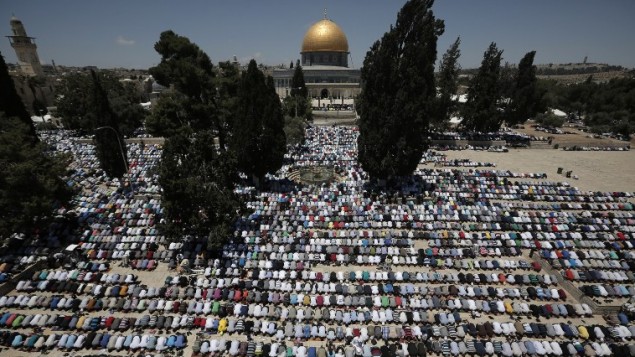
Muslims have refused to enter the site and have prayed in the streets outside for more than a week after Israel installed new security measures at the Haram al-Sharif compound, known to Jews as the Temple Mount. The measures followed an attack that killed two policemen, and included metal detectors at entrances.
Palestinians view the move as Israel asserting further control over the site, which houses the revered Al-Aqsa mosque and the Dome of the Rock.
Israeli authorities said the metal detectors were needed because the July 14 attackers smuggled guns into the site and emerged from it to attack the officers.
Israeli removal of holy site metal detectors not enough: Erdogan
Protests and deadly unrest have erupted in the days since, with clashes breaking out around the compound in Jerusalem's Old City and in the occupied West Bank, leaving five Palestinians dead.
There are concerns that Friday's main weekly Muslim prayers - which typically draw thousands to Al-Aqsa - will lead to serious clashes between protesters and Israeli security forces.
Following intensive international diplomacy and warnings of the potential of wider unrest, Israel removed the metal detectors early on Tuesday. Cameras installed after the attack on the police were also removed.
But Israeli officials said they were to be replaced with "advanced technologies" - widely believed to be smart cameras with facial recognition technology.
Railings installed at the site's entrance before the metal detectors were removed have also remained in place. The railings and suspicions over what new measures Israel is planning have led Palestinian and Muslim leaders to continue to call for a boycott of the site, and worshippers have heeded their call.
Palestinian president Mahmud Abbas, who announced a freeze on contacts with Israel last week over the dispute, said on Tuesday the suspension would continue until the site was returned to the way it was before the crisis began.
Turkish President Recep Tayyip Erdogan, who has spoken out strongly against the new security measures, welcomed Israel's removal of the metal detectors but said it was "not enough".
Israel struck back harshly, saying in a foreign ministry statement that "it's absurd that the Turkish government, which occupies northern Cyprus, brutally represses the Kurdish minority and jails journalists, lectures Israel, the only true democracy in the region". "The days of the Ottoman Empire have passed," it said.
Israel's decision to remove the metal detectors came after Prime Minister Benjamin Netanyahu held talks with Jordanian King Abdullah II, who had demanded their removal. In a telephone call on Wednesday, Abdullah and Abbas "stressed the importance of continuing coordination to bring the situation back to what it was before the outbreak of the crisis and ensure the historical and legal status of the Holy Mosque is respected", Jordan's Petra news agency reported.
A top aide to US President Donald Trump earlier this week held talks in Jerusalem on the crisis. UN Middle East envoy Nickolay Mladenov has warned of wider unrest and said: "We are not over this crisis yet".
On the political front, the Israeli parliament on Wednesday approved the first reading of a draft bill which would complicate any handover of zones of Jerusalem under any peace settlement with the Palestinians.
Israel cites immunity for guard in deadly Amman embassy shooting
With tensions running high, Israel last Friday barred men under 50 from entering the Old City for prayers. Protests and clashes erupted later in the day in Jerusalem and the West Bank, killing three Palestinians. The deadly stabbings of three Israelis came the same day.
As tensions rose in the days afterwards, a diplomatic standoff between Israel and Jordan may have helped negotiations on the metal detectors.
On Sunday night in Amman, an Israeli embassy security guard shot dead a Jordanian who attacked him with a screwdriver, Israeli officials said. A second Jordanian was also killed, apparently by accident.
Israel insisted the guard had diplomatic immunity and rejected Jordanian demands to question him. The guard and other diplomats arrived home on Monday after a deal that a Jordanian government source said also involved the mosque compound.
Jordan is the official custodian of the Muslim holy sites in Jerusalem. The compound is in east Jerusalem, seized by Israel in the 1967 Six-Day War and later annexed in a move never recognised by the international community.
The third-holiest site for Muslims and the most sacred for Jews, it is at the heart of the Israeli-Palestinian conflict and has served as a rallying cry for Palestinians.
In 2000, then Israeli opposition leader Ariel Sharon's visit there helped ignite the second Palestinian intifada, or uprising.
1732503274-0/Untitled-design-(43)1732503274-0-405x300.webp)
1732501636-0/Untitled-design-(42)1732501636-0-165x106.webp)

1732498967-0/Outer-Banks--(1)1732498967-0-165x106.webp)
1732086766-0/BeFunky-collage-(74)1732086766-0-165x106.webp)












COMMENTS
Comments are moderated and generally will be posted if they are on-topic and not abusive.
For more information, please see our Comments FAQ